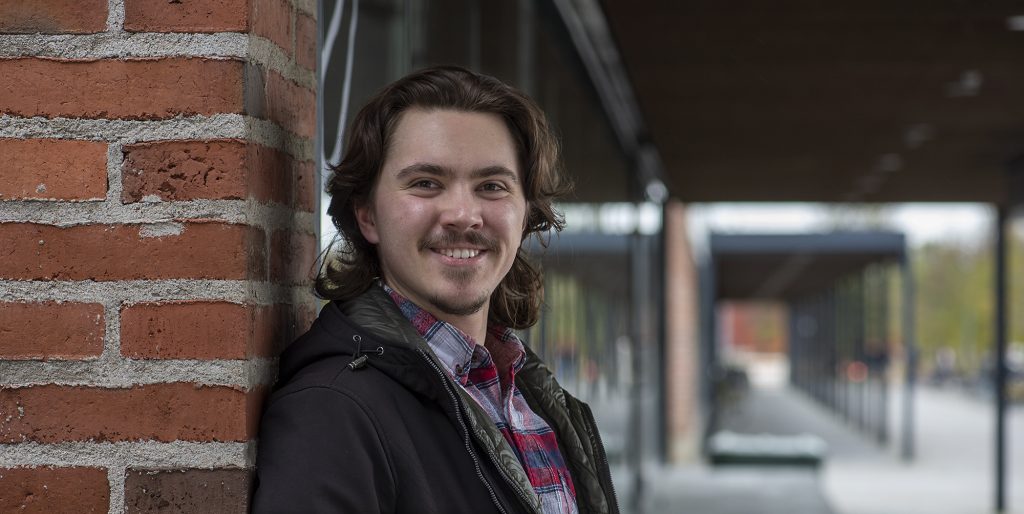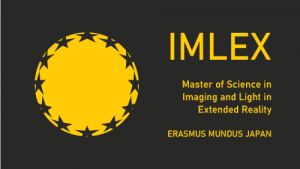Alexander Gaura

“The practical applications of different extended reality solutions are intriguing”
Princeton undergraduate Alex was among the first batch of students enrolled on the brand new Erasmus Mundus Japan – Master of Science in Imaging and Light in Extended Reality (IMLEX) programme; taking place in the middle of these exceptional pandemic times. However, the University of Eastern Finland impressed Alex with its top-notch teaching and facilities and he’s had a lot of fun doing practical experiments with robot arms, virtual headsets and other interesting devices. Now he’s looking forward to studying in Japan – the ‘promised land of hi-tech’.
US native Alex was about to graduate with a Bachelor’s degree in Math, when he started looking at different Master’s options both in the States and in Europe. He came across the brand new IMLEX programme almost by accident.
–Actually, I was browsing Twitter when I saw a post about the EU financing a new Erasmus programme, organised in collaboration with Japan. I got immediately interested, so I tried to search for the programme website but couldn’t find anything as the website wasn’t even up yet. So, I contacted the UEF coordinator for some information.
Alex’s background in Math, and minors in statistics and machine learning matched perfectly with the prerequisites of the programme. In the end, his conversations with the UEF coordinator and the generous scholarship scheme convinced Alex to apply – along with the exciting study content that was not available in many universities.
–I’m a person with many interests, from linguistics to computer science, and I’ve always been interested in how information is conveyed. It’s fascinating to study how we see things, how colors are represented and how we can simulate experiences that seem real. The IMLEX programme is one of the very few that’s focused on extended reality, and I wanted to be learning about colors and to be creating simulated systems, so I thought that obviously I should apply.
Overall, the application process itself didn’t cause Alex too much hassle – except for some personal circumstances that required extra form filling.
–My parents are Polish, so I wanted to get my Polish citizenship and passport before applying. Also, I didn’t have my Bachelor’s diploma yet, but with some extra paperwork and help from the UEF coordinators, everything got sorted out. They really helped me keep my hopes up during the slightly unconventional application process.
VR headsets and robot arms
Alex arrived in Joensuu at the end of August 2020.
–The pandemic made everything different. I had to stay in quarantine for the two first weeks because I’d come from outside Finland. Luckily, the university assigns all international students a personal student tutor, so someone was there to help me get the keys to my apartment, organise grocery deliveries and other practical things like that.
Since the start of the semester, most of the courses have been taught online.
–I prefer attending classes in person, but the professors are doing the best they can to provide good learning experiences. So far, I’ve had courses in color science, algorithms, optics, and robotics, so it’s been a nice mix of computer science and physics.
But how does studying at the internationally renowned Princeton university compare to the UEF, a fairly young university in the eastern part of Finland?
–I think overall, most universities are pretty similar in the content they provide. It’s just about the culture that you’re putting yourself into and what you’re used to. I know that Princeton is wealthy, so that was probably the only thing, because I wasn’t sure what the facilities would be like in Joensuu. But I have to say I was very impressed when I walked around the campus and checked out the different equipment at the department. The teaching the professors at UEF have provided so far is not really all that dissimilar from the teaching at Princeton.
In these high-end facilities, the IMLEX students get to do many kinds of hands-on group work experiments.
–It’s really open what we can be doing. One of my course mates had been working with robots before, so – just out of curiosity – he asked if the university had any to work with. I thought that it was probably a ridiculous question, but they answered ‘Yes, we’ve just got one, but we haven’t set it up yet’. So, we set it up and started experimenting with it.
The group did a simulation with a VR headset with which they could control a robot arm.
–I’d never worked with any of these things before or even played VR video games, so it was cool to get to build and programme actual physical systems that you can move, see, and feel. Most programming I’ve done in my education has been limited to getting my computer to do things by programming neural networks for image recognition or language processing, or programming my computer to do really hard calculations for me. Those can be cool in their own right, but it really is a different thing to see something move in real life because of code you made, and you get to have a whole different experience with the added VR headset. There is just something fun and exciting about it while it’s happening.
Japan calling
Of the possible two tracks in the IMLEX programme – computational imaging and lighting – Alex will take the computational imaging track.
–The real difference will be next semester, when the two tracks go to separate universities. I will go to France, where we’ll get to learn the heavier programming stuff and imaging. What I’m most excited about is the 3rd semester in Japan, where we’ll focus on programming that is useful for XR specifically. I come from a small town, so I have to say that I’m most excited to be living in the bigger cities, especially as I’ve lived in Japan before, teaching English. I think it was the best experience of my life so far.
Alex’s background already offers multiple options for future employment, but the IMLEX programme opens even more doors.
–The practical applications of different extended reality solutions are intriguing. I’ve heard that it can even be used to train surgeons. Extended reality makes things so much more accessible for everyone. During my Bachelor studies I did an internship where I was advising students how to choose colleges, so one potential field of application could be to simulate what kind of jobs exist in the future. Currently, you can watch videos, but it might be more interesting to walk through a day as that person, to see what it’s really like.
Working in academia has not been ruled out either.
–My only concern is that the graduate students seem to be super stressed in the US, but maybe I should explore the PhD options in Europe if the situation is not the same here. Or I could be working in tech, with something related to education, colors or sound technology. The Master’s degree will give me a solid background to both.
Overall, Alex is pleased with the choice of programme and excited about what the future holds.
– I will keep exploring my options and do what sounds fun. I have a background in multiple fields, so I think that I have many roads to choose from.
